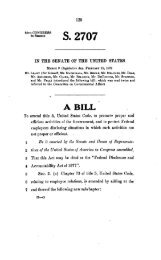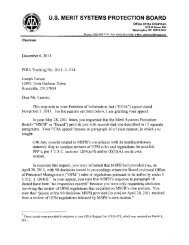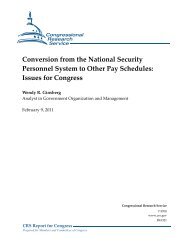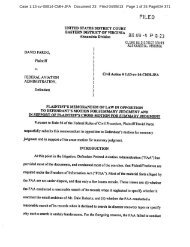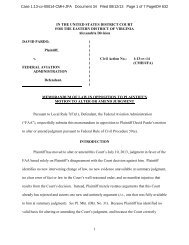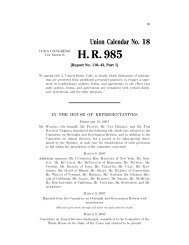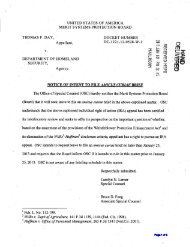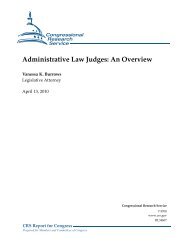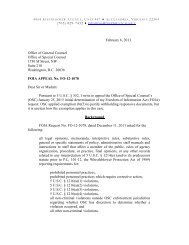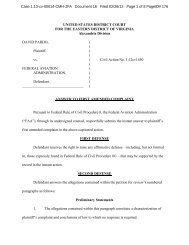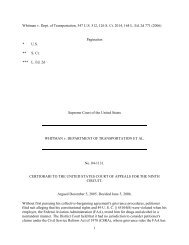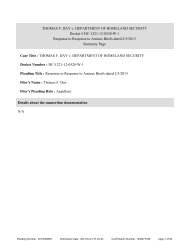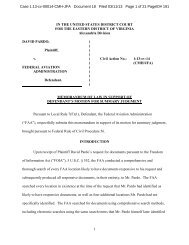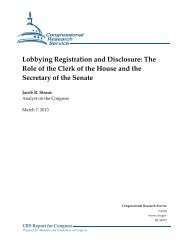The Fair Labor Standards Act (FLSA): An Overview - MSPB Watch
The Fair Labor Standards Act (FLSA): An Overview - MSPB Watch
The Fair Labor Standards Act (FLSA): An Overview - MSPB Watch
You also want an ePaper? Increase the reach of your titles
YUMPU automatically turns print PDFs into web optimized ePapers that Google loves.
<strong>The</strong> <strong>Fair</strong> <strong>Labor</strong> <strong>Standards</strong> <strong>Act</strong> (<strong>FLSA</strong>): <strong>An</strong> <strong>Overview</strong>coverage to include domestic service workers who are employed in private households. 50Domestic service workers include housekeepers, cooks, full-time babysitters, and others. 51In addition to extending minimum wage and overtime coverage to domestic service employees,the 1974 amendments added two exemptions that affect two types of domestic service workers:domestic service workers who provide companionship services and live-in domestic serviceworkers. Under Section 13(a)(15) of the <strong>FLSA</strong>, domestic service workers who providecompanionship services in private homes are exempt from both the minimum wage and overtimestandards of the act. Section 13(b)(21) of the act exempts from overtime, but not the minimumwage, domestic service workers who provide live-in domestic services.On December 27, 2011, DOL issued a Notice of Proposed Rulemaking (NPRM) that wouldchange the definition of companionship services. 52 Under current regulations:• Companionship services are defined as “those services which provide fellowship,care, and protection for a person who, because of advanced age or physical ormental infirmity, cannot care for his or her own needs.”• Companionship services may include household work related to the care of theaged or infirmed individual, such as preparing meals, bed making, or washingclothes. General household work (such as housecleaning) may also be included incompanionship services. However, general household work must be “incidental”to providing companionship services. Current regulations define incidental as20% or less of the total hours worked.• Companionship services do not include services performed by trained personnel,such as registered or practical nurses. 5350 <strong>The</strong> 1974 amendments added Sections 6(f) and 7(l) to the <strong>FLSA</strong>. Section 6(f) extended minimum wage coverage todomestic service employees. Section 6(f) states that<strong>An</strong>y employee (1) who in any workweek is employed in domestic service in a household shall bepaid wages at a rate not less than the wage rate in effect under subsection (b) of this section unlesssuch employee’s compensation for such service would not because of section 209(a)(6) of theSocial Security <strong>Act</strong> (42 U.S.C. 409(a)(6)) constitute wages for the purposes of title II of such <strong>Act</strong>(42 U.S.C. 401 et seq.), [i.e., the employee’s pay must be wages for purposes of Social Security] or(2) who in any workweek (A) is employed in domestic service in one or more households, and (B)is so employed for more than 8 hours in the aggregate, shall be paid wages for such employment insuch workweek at a rate not less than the wage rate in effect under subsection (b) of this section.[Note: Section 6(b) requires employers to pay employees at least the minimum wage rate requiredin Section 6(a) of the <strong>FLSA</strong>.]Section 7(l) extended overtime coverage to domestic service employees. Section 7(l) states thatNo employer shall employ any employee in domestic service in one or more households for aworkweek longer than forty hours unless such employee receives compensation for suchemployment in accordance with subsection (a) of this section. [Note: Section 7(a) requiresemployers to pay covered employees at least one-and-a-half times their regular rate of pay forovertime.]51 DOL, Coverage Under the <strong>Fair</strong> <strong>Labor</strong> <strong>Standards</strong> <strong>Act</strong>.52 U.S. Department of <strong>Labor</strong>, Wage and Hour Division, “Application of the <strong>Fair</strong> <strong>Labor</strong> <strong>Standards</strong> <strong>Act</strong> to DomesticService,” Federal Register, vol. 76, December 27, 2011, pp. 81190-81244. (Hereafter cited as DOL, Application of the<strong>Fair</strong> <strong>Labor</strong> <strong>Standards</strong> <strong>Act</strong> to Domestic Service.) DOL twice extended the comment period on the proposed rule.Comments were due on or before March 21, 2012. U.S. Department of <strong>Labor</strong>, Wage and Hour Division, “Applicationof the <strong>Fair</strong> <strong>Labor</strong> <strong>Standards</strong> <strong>Act</strong> to Domestic Service,” Federal Register, vol. 77, March 13, 2012, pp. 14688-14689.53 29 C.F.R. §552.6. DOL, Application of the <strong>Fair</strong> <strong>Labor</strong> <strong>Standards</strong> <strong>Act</strong> to Domestic Service, p. 81195. A registered(continued...)Congressional Research Service 14



